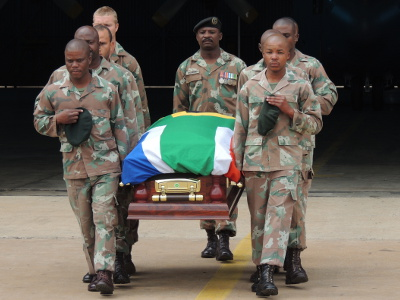The South African National Defence forces reported last week Wednesday that two soldiers were killed when M23 militants attacked the town of Sake in the Democratic Republic of Congo (DRC) with 20 injured. The attacks show the increasing hazards South African troops face abroad at the hands of guerrilla warfare.
“Four members who were critically injured have been hospitalized while the rest who suffered minor injuries are expected to be discharged soon,” the statement read. The SANDF said families of the two members who have lost their lives have been informed and all procedures to bring their mortal remains are in process. “The names of the deceased will be communicated in due course.” On 30 May 2024, Sergeant Mbalelo David Ngubane passed away following contact between the M23 and Southern African Development Community (SADC) forces. Ngubane, who was 39 years old, was the operational medical practitioner in the South African Military Health Service (SAMHS).(South African Government News Agency)
Military deployment to the jungles of the Congo should involve proper training in such terrain. Soldiers from any country could face ambush in the dense forests of the Congo. It is one of the few weapons the M23 has on its side. The loss of the two soldiers will have the families grieving. Their bread winners and loved ones have been taken. The South African army unit was there on a peace keeping mission for SADC. Both the DRC and South Africa are members of SADC. However, the DRC has been well known for its chronic instability. There must be diplomatic pressure from with the African Union, SADC, and the East Africa Community (EAC) to end the violence between the MK rebels and the government in Kinshasa.
The deaths in what is believed to be an M23 mortar attack of on what South African Department of Defence (DoD) Head of Communication (HoC) Siphiwe Dlamini called “our base” brings to five the South African combat deaths since SAMIDRC first deployed over six months ago in mid-December. The South African commitment to the regional bloc mission has –almost continually – been under fire from military observers, commentators, academics and South Africa’s largest military trade union. At issue is, among others, the lack of air support for trooping, logistics and medevac positions as well as insufficient and ageing equipment to take on a well-organized and outfitted opponent.(DefenceWeb)
The problem with SANDF is that it has become poorly equipped and trained for decades. It is not what it was meant to be. The fact that South Africa’s troops have been underfunded exposes a lack of efficiency on the part of the Department of Defence and the president as commander-in-chief. Whose role is it to be advising the president about providing air cover? Is it not the Joint Operations Division? Were they not, being the most experienced generals aware of the rot being undergone in the armed forces? Now this has led to a massive tragedy on display to the rest of the world concerning a weakness in what should be Africa’s top military.
Former Democratic Alliance Shadow Defence Minister Kobus Marais told the Star the latest deaths of SANDF soldiers in the DRC is no surprise due to the poor support and resources given to South Africa’s SAMIDRC deployment. “It is now a regular occurrence that our soldiers are returned to their loved ones in body bags.” (DefenceWeb)
“In order to save the lives of our soldiers the president and the SANDF have two options: (1) Provide more funding and resources and logistical support to our soldiers, including ammunition and prime mission equipment and more soldiers. This is unfortunately not affordable and sustainable given the weak GDP and lower defence budget. (2) The alternative is to initiate AU and EAC peace talks for a permanent solution to the eastern DRC conflicts while withdrawing all our soldiers and equipment from the DRC,” Marais stated.(DefenceWeb)
The deployment of South African Military in the Democratic Republic of Congo (SAMIDRC) is proving itself to be a death sentence. South African soldiers are incapable of dealing with being sent unprepared or ill trained to the tropical jungles of the Congo. How is it that South Africa which still has a significantly large export-based economy is unable to provide its army with the necessary weaponry and equipment?
So now to prevent our soldiers from returning home in body bags for burial in flag draped coffins, president Cyril Ramaphosa needs to provide better funding and up-to-date equipment in terms of resources and proper weaponry. Providing more soldiers with out proper training could only exacerbate the situation. South Africa’s economy is already in a weak state, and no one can expect any miracles until a new government coalition or other wise comes in to power.
At this Ramaphosa needs to support the efforts of the African Union (AU) and East African Community (EAC) (of which the DRC recently became a member) to arrange for talks. This could lead to a ceasefire between the MK rebels and the government of DRC president Felix Tshisekedi and possible disarmament of the MK group. All this comes down to what is decided concerning the SANDF in Pretoria.
Article written by:
Yacoob Cassim
Journalist at Radio Al Ansaar





